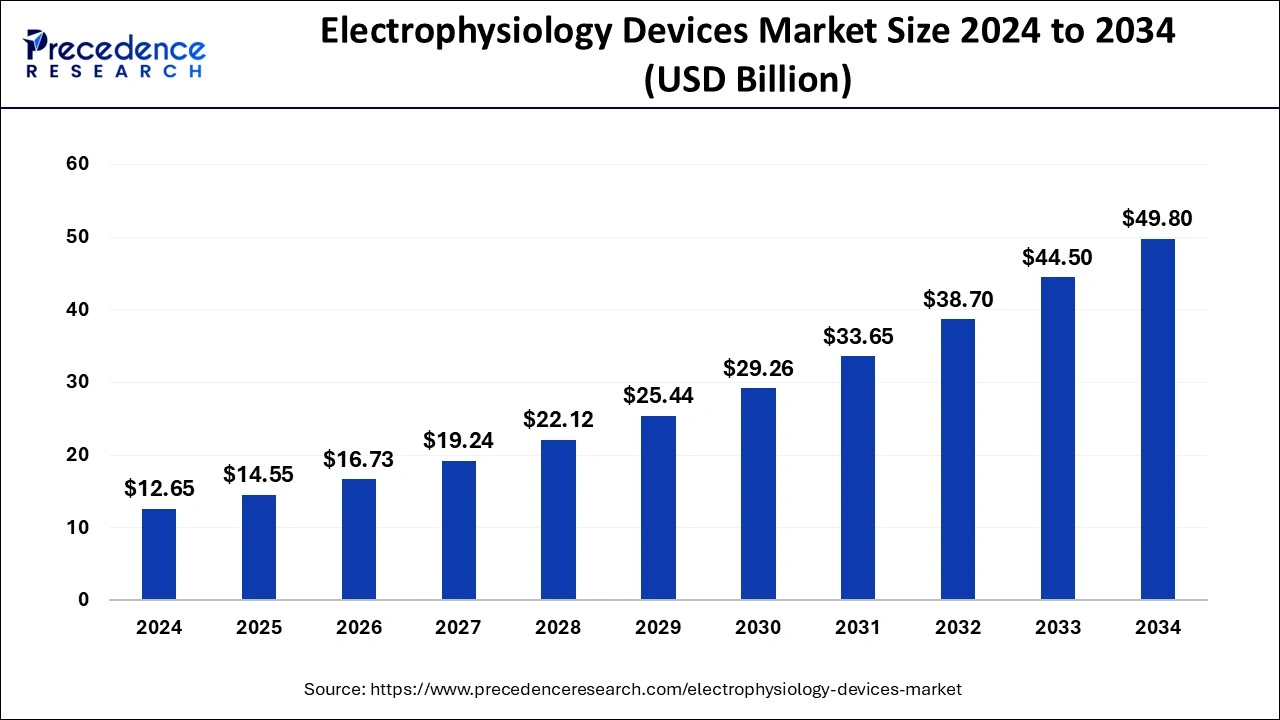Electrophysiology Devices Market Size to Surpass USD 49.80 Bn By 2034
Electrophysiology Devices Market
The electrophysiology devices market size is valued at USD 12.65 billion in 2024 and is expected to surpass around USD 49.80 billion by 2034, with a CAGR of 14.69%.

Get Sample Copy of Report@ https://www.precedenceresearch.com/sample/1100
Key Points
- In 2024, North America dominated the market with the highest share of 49%.
- Asia Pacific is projected to grow at the fastest CAGR throughout the forecast period.
- The atrial fibrillation segment recorded the largest market share by indication in 2024.
- The diagnostic devices segment contributed significantly to revenue in 2024.
Market Dynamics
Drivers
The growing prevalence of cardiovascular diseases, particularly arrhythmias such as atrial fibrillation, is a major factor driving the electrophysiology devices market. The increasing adoption of minimally invasive procedures and technological advancements in electrophysiology mapping and ablation techniques have enhanced the accuracy and effectiveness of treatments.
Additionally, the rising geriatric population, which is more susceptible to heart conditions, is fueling market growth. Government initiatives and healthcare policies supporting cardiac care, along with growing awareness about early diagnosis and treatment of arrhythmias, further boost market expansion.
Opportunities
The integration of artificial intelligence and machine learning in electrophysiology devices presents significant opportunities for market players. These advancements are enabling real-time analysis, improved diagnostics, and personalized treatment plans.
The expansion of healthcare infrastructure in emerging markets, coupled with increased investments in cardiac care, is expected to drive demand. Additionally, the rise of ambulatory surgical centers and outpatient care facilities offers new growth prospects by making electrophysiology procedures more accessible to patients.
Challenges
High costs associated with electrophysiology procedures and devices remain a key challenge, limiting accessibility in low- and middle-income countries. The lack of skilled professionals trained in electrophysiology techniques also hampers market growth.
Furthermore, regulatory hurdles and stringent approval processes for new electrophysiology devices create delays in market entry. The potential risks and complications associated with ablation procedures and implantable devices, such as infections and device malfunctions, also pose challenges to widespread adoption.
Regional Insights
North America leads the electrophysiology devices market, driven by advanced healthcare facilities, a high prevalence of cardiac diseases, and strong research and development investments. Europe follows closely, supported by favorable reimbursement policies and an increasing aging population.
Asia Pacific is anticipated to witness the fastest growth due to rising healthcare awareness, expanding medical infrastructure, and a growing burden of cardiovascular diseases. Meanwhile, Latin America and the Middle East are gradually adopting electrophysiology solutions as healthcare access improves.
Segments Covered in the Report
By Indication
- Atrial Fibrillation (AF)
- Atrioventricular Nodal Re-entry Tachycardia (AVNRT)
- Supraventricular Tachycardia
- Bradycardia
- Wolff-Parkinson-White Syndrome (WPW)
- Others
By Application
- Diagnostic Devices
- Diagnostic Electrophysiology Catheters
- Holter Monitoring Devices
- EP Mapping & Imaging Systems
- Electrocardiograph (ECG)
- Insertable Cardiac Monitors (ICM)
- Others
- Treatment Devices
- Automated external defibrillators (AEDs)
- Implantable Cardioverter Defibrillators (ICDs)
- CRT-D
- CRT-P
- Catheters
- Pacemakers
- Others
By End-User
- Ambulatory Surgical Centers
- Hospitals
- Others
By Regional Outlook
- North America
- U.S.
- Canada
- Europe
- U.K.
- Germany
- France
- Asia Pacific
- China
- India
- Japan
- South Korea
- Rest of the World
Ready for more? Dive into the full experience on our website@ https://www.precedenceresearch.com/
